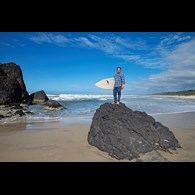By Tim Baker
Close readers of this blog and, indeed, the PCFA website, may have picked up on the carefully guarded secret that I have written a book about my experience living with prostate cancer and its treatment.
As this is launch week, I thought I’d try and clear up what the book is and what it is not, anticipating questions some might have about this weighty tome and its intent.
Patting The Shark is not another guide on how to “beat” or “conquer” cancer, full of dubious alternative therapies. I am not a doctor and I have no interest in offering unqualified medical advice.
It is essentially my own experience, written with as much vividness and candour as I could muster, through the travails of cancer treatment, the brain fog of chemo, the fatigue of hormone therapy, and the lingering existential dread of an advanced and incurable cancer diagnosis.
It began life purely as a personal coping strategy, writing therapy, to try and help me process the many stressors and uncertainties of this experience. As time went on, I began to suspect that there might be something worthwhile about this writing to share with other men going through a similar experience.
It is also a call for a more integrative approach to cancer care, treating the whole person and not just the tumour, affording patients a greater sense of dignity, agency and empowerment in how they navigate their path through cancer treatment.
That word “integrative” rings a few alarm bells for some people, as I have learnt to my detriment. I’ve been howled down at prostate cancer support groups for daring to utter the word, or its simile, “holistic” essentially because I think some misunderstand what these words mean.
I believe in medical science. I am on intermittent hormone therapy, had early chemotherapy, targeted radiation and surgery along my prostate cancer journey. But I also try to meditate and exercise daily, follow a mainly plant-based diet, use medicinal cannabis oil to assist with sleep, have consulted with integrative doctors and tried a range of supplements and off-label drugs they’ve recommended. Integrative, in my understanding, is practiced by qualified medical doctors who employ evidence-based complementary or supportive therapies alongside mainstream cancer treatments.
Whether any of these complementary therapies have improved my prognosis or slowed cancer’s progression I’m unqualified to say. But seven years after being diagnosed with metastatic prostate cancer, with lesions in my right femur and left rib, I’m still here, still writing and surfing, and the front-line treatment of hormone therapy is still effective. In those seven years, I’ve written two books (the first on the history of iconic Australian surf brand Rip Curl), I’m halfway through a creative writing PhD, been on surf trips with my son to the Maldives and Melanesia, skied in Japan and snorkelled the Great Barrier Reef.
While prostate cancer and its treatment has taken a cruel toll on my mental health, my masculinity, my marriage and working life, I haven’t wanted to let it stop me from doing things either. I’ve never wanted to present myself as some sort of miraculous cancer survivor. I still have cancer and have ongoing blood tests, scans and treatment. What I have tried to do is make my peace with my diagnosis and, hence, my mortality. My book is very deliberately sub-titled: “learning to live well with cancer”.
Many, if not most, of the numerous cancer memoirs I have read as part of my PhD research seem to fall into one of two camps: the stoic cancer victim bravely facing end of life, and the super-natural cancer survivor somehow defying the medical orthodoxy. What I’ve tried to write about is the sizeable space that exists between these two poles, which I think occupies the time and energy of most of us living with cancer. And that is the rather more mundane business of waking up each day and trying to find meaning, purpose and joy in our lives in the here and now.
I don’t always succeed in this, and I’ve tried to document the moments of despair and darkness as candidly as the transcendent experiences of peace and acceptance. I’ve also tried to initiate a more open conversation about the impacts of hormone therapy on our sense of self, our masculinity and sexuality and relationships – themes that we blokes are not traditionally great at talking about. I also hope it helps other men feel less alone and that some of the lessons I’ve learnt along the way around mitigating the side effects of treatment and staving off despair might prove useful to others.
Ultimately, it’s a plea for the medical establishment to more fully recognise the huge psycho-social challenges and quality of life issues men living with prostate cancer face, and how lifestyle strategies can be an important element of their self-care. It seems to have arrived into the world with a bit of a splash, with my weathered noggin featured on the front cover of the national broadsheet’s Weekend magazine and an extract inside. If the book helps make any man’s experience with prostate cancer less traumatic, I’ll consider the alarming sense of vulnerability and self-exposure it’s induced in me entirely worthwhile.
This August, Tim will launch his latest book, Patting the Shark. This candid story documents his journey learning to live well with prostate cancer. To launch Patting the Shark, Tim will join Professor Suzanne Chambers at Brisbane Library on August 21, 2022 from 11am to 12pm to talk about his journey. To attend, click here.
About the Author

Tim Baker is an award-winning author, journalist and storyteller specialising in surfing history and culture, working across a wide variety of media from books and magazines to film, video, and theatre. Some of his most notable books include “Occy”, a national bestseller and chosen by the Australia Council as one of “50 Books You can’t Put Down” in 2008, and “The Rip Curl Story” which documents the rise of the iconic Australian surf brand to mark its 50th anniversary in 2019. Tim is a former editor of Tracks and Surfing Life magazines. He has twice won the Surfing Australia Hall of Fame Culture Award.
Tim was diagnosed with stage 4, metastatic prostate cancer in 2015 with a Gleason score 9. He was told he had just five years of reasonable health left, but seven years on, at 57, he’s still surfing, writing, and enjoying being a dad. His latest book, Patting The Shark, also documents his cancer journey and will be published in August. Tim will be sharing weekly insights into his journey to help other men who have also been impacted by prostate cancer.








